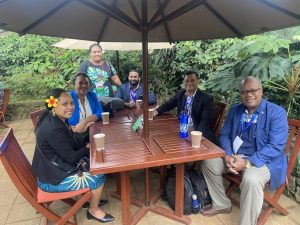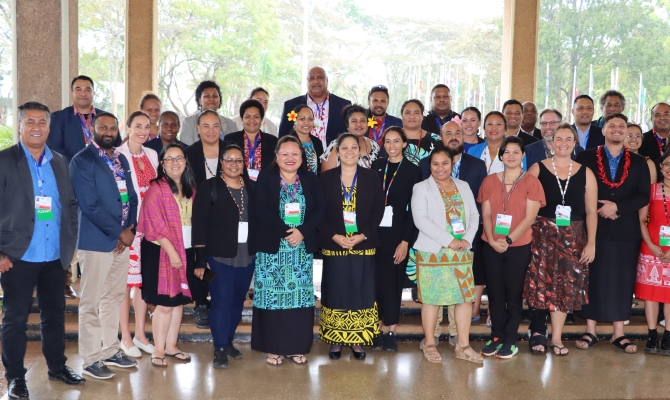Fourteen Pacific countries advocating for the priorities of their communities at the Intergovernmental Negotiating Committee (INC) to develop an international legally binding instrument on plastic pollution, including in the marine environment, are gathering in Auckland from 12-15 February 2024.
They are returning to the drawing board following the third INC in Nairobi Kenya which concluded with an agreement on a starting point for negotiations at the fourth session (INC-4) in Canada April 2024.
In Kenya last year, delegations from the Cook Islands, Federated States of Micronesia, Fiji, Kiribati, Marshall Islands, Nauru, Niue, Palau, Papua New Guinea, Samoa, Solomon Islands, Tonga, Tuvalu and Vanuatu, took part in a week of intense, complex negotiations.
In three contact groups, negotiators pored over dozens of member submissions and statements in addressing the six parts of the zero draft document released after INC-2 held in Paris. They went through a compilation of text to include all the views of Members, prepared a validated, co-facilitator merged text, and found a way forward on issues not discussed as yet.
But the primary sticking point was the question of: Whether to manage plastics pollution from the “bottom up” — making nations responsible for environmental clean-up and costs — or mandate a stricter approach that clearly limits or bans production of “problematic” and hard-to-recycle plastics.
The issue will be brought back on table in Auckland during the Pacific Regional Preparatory meeting where Pacific countries will discuss, review and strategise for the fourth session of the Intergovernmental Negotiating Committee.

Today, we sit down with SPREP’s Director of Waste Management and Pollution Control (WMPC),Anthony Talouli, for a chat about where the process is at, how Pacific countries are progressing and the next steps of INC:
Question: Talofa Tony, time has gone by so quickly since INC-1 in Uruguay and now we are preparing for the fourth INC in Canada in April. Can you share some of your thoughts with us on the process so far?
Answer: Firstly, I’d like to thank the Government of Australia for providing the funding for SPREP to allow our member countries to be able to attend and engage in what we view as a very important process in our work to address a growing crisis, not just for the world but more so for the Pacific.
This has been a very big help because it’s allowed us to plan long-term instead of from INC-to-INC. The funding has allowed us to plan for all five INCs and help us coordinate and assist our member countries to be there. This has also helped us to better work with the PSIDS chair, firstly Samoa and then Palau, which has been really helpful for our coordination work. This has also helped with our work with the AOSIS chair, which is Samoa, and we are extremely grateful.
Question: How has this support made a difference?
Answer: It’s made a big difference in a number of ways but one of the positives we have seen since INC-1 has been the increase in the political support we’re getting from countries, and the involvement of more senior negotiators and officials from countries. We know that in the Pacific we have some of the best negotiators in the world in other MEA processes, which is experience we want to learn from and grow as we move forward in this INC process. I am mindful that in the waste and pollution space this is very new but we have seen the capacity of many Pacific negotiators in the plastic treaty negotiations being built over the past few years. They all bring different strengths to the table and that diversity in ability will help us in the long run.
Our SPREP team, including our Director General, Sefanaia Nawadra, who has been attending these meetings, is very keen to ensure this continues and that we get the best possible outcome for our countries from this INC process. I think in terms of coordination we are learning and getting better.
Question: Now take us back to Nairobi during INC-3 at the end of 2023, what are your thoughts about the outcome from the Pacific’s perspective?
Answer: I know from a SPREP perspective that it is our job to provide support for our member countries, to give them the information that they need to make those decisions. It is up to the countries to use that information and technical advice to negotiate in line with their national interests. So from INC-3 in Nairobi, we saw the Pacific putting its interest forward to protect the Pacific people, environment and the Pacific Ocean. We saw that the Pacific countries really stood their ground in their position to address upstream in efforts to tackle plastic waste which was very brave.
In terms of progress, Nairobi was a positive step and a good outcome for the Pacific. Of course we cannot get everything we want but the INC process is ongoing. There are options to explore and lessons learnt which is important to consider as we move forward. Overall, the Pacific has done well but we have a lot more work to do.
Question: You’ve alluded to the need to have more experienced negotiators in the room. Can you elaborate?
Answer: There is definitely a need to have a lot more experienced negotiators in the room because of the knowledge and leadership they provide. As I said, we are starting to see this in the INC process with some of the seasoned negotiators taking their positions and offering a historical perspective of where we have come from and why it’s important that we head a certain direction.
I feel that we need this understanding and it’s something SPREP is keen to continue to develop. On the other hand, it’s not just about bringing more experienced negotiators, it’s about using them to develop and build the capacity of new negotiators, transferring that experience and knowledge so the work we are doing continues. Someone eloquently said that for many young people, they need to understand how the house was built and I feel like for the INC process, that is part of what is happening. We are getting some of the more seasoned negotiators to not only explain how the house was built, but during the negotiations, they are also showing how it was built so that transfer of knowledge is taking place for the betterment of our countries and people.
The leadership of SPREP and the work done over the years to build those relationships is definitely a key driver in all this and it’s something we want to continue to do.
Question: With the outcome of INC-3, where to from here for Pacific countries?
Answer: We go back to the drawing board. From INC-3 to INC-4, there is no intercessional work but we are going to get the revised zero draft which we will review. Our work will be to develop information based on that revised zero draft and provide them to our Pacific countries to inform their planning for negotiations. We’re talking about getting more data, information, positions, political strategies and all these options to allow our Pacific countries to be in a position of clarity when they make decisions at the negotiations table. As we look to Canada, I think our work in terms of strategising becomes very important looking at the revised zero draft.
Question: With the knowledge of what happened at INC-3, how can Pacific countries prepare for the next round of talks? What do they need to do?
Answer: They need to have conversations at the national level about how high their ambitions are in terms of what they want to do and they need to bring that to the rest of the Pacific countries. That’s why our Pacific coordination meeting are so important.
I know some of the countries have been very quiet but now is the time for them to start thinking about some of these issues. As a collective, I think it’s important we look at all the positions, if possible and strategise on where we can get our biggest wins. SPREP will continue to reach out to the countries to see what they need, look at what is possible and doable and continue the work from there.
SOURCE: SPREP/PACNEWS


















